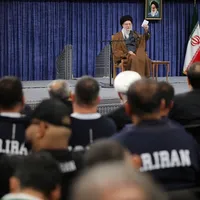Shamkhani, a member of Iran’s Defense Council and a senior adviser to Supreme Leader Ali Khamenei, briefly appears in footage from a women-only ceremony where some guests were unveiled.
In his first reaction to the leaked video, Shamkhani told state media, “As I said earlier: Hey you bastards, I’m still alive,” referencing a quote from Papillon (1973).
He had previously used the same line when addressing Israel after surviving an airstrike on his home in Tehran during June’s war.
Shamkhani also posted the same line on his X account in Hebrew, implicitly accusing Israel of involvement in the leak of his daughter's wedding video. An X account allegedly run by Mossad earlier hinted at possible Israeli role.
Shortly after the leak, state-aligned media closed ranks around him.
The IRGC-affiliated Javan newspaper declared that “addressing personal ethical or behavioral misconduct is prohibited,” insisting the event involved neither alcohol nor “moral corruption.” It cited eyewitnesses who described Shamkhani’s behavior as “proper and acceptable.”
‘Revenge’
Ezzatollah Zarghami, former head of state broadcaster IRIB, likened the hacking of private gatherings to “a new form of Israeli assassination,” while moderate cleric Mohammad-Ali Abtahi rejected any wrongdoing, saying the video merely showed unveiled women in a female-only section.
Abdullah Ganji, a pro-government commentator and adviser to Tehran’s mayor, called the leak “immoral” and “revenge by any means.”
But critics argue that the real insult lies in the establishment’s double standard.
“Their message to people like us is always the opposite — that your private life is fair game,” said a female civil activist who was imprisoned during the 2022 protests.
She told Iran International that interrogators repeatedly pried into her personal life: “They said, if you continue your activities, we will shame you publicly before your family and colleagues by exposing details of your private life.”
Two rules for all
Authorities routinely surveil and punish citizens—sometimes costing them jobs—for unveiled photos or mixed-gender gatherings.
“When ordinary people are humiliated for the slightest breach, calls to respect the privacy of the powerful ring hollow,” one social media user wrote.
Leaked images have destroyed the careers of environmental official Kaveh Madani and parliamentary candidate Minou Khaleghi, while detainees have reported being threatened with the release of personal photos to extract confessions.
Despite the uproar, few expect consequences for Shamkhani, one of Khamenei’s closest allies who has survived previous allegations of corruption involving his family.
‘Private is political’
Germany-based journalist Massoud Kazemi, who has investigated Shamkhani’s economic dealings, described him as “one of the leaders of Iran’s mafia networks—in oil, shipping, and security,” adding that “using such leaks to oust him is improbable.”
The timing of the leak may point to internal rivalries.
In a recent interview, Shamkhani revisited the 2020 downing of a Ukrainian passenger jet, claiming he immediately informed then-President Hassan Rouhani—a statement Rouhani’s team has denied.
The hardline daily Vatan-e Emrooz suggested those comments might have provoked “revenge” from rival factions.
Regardless of who was behind it, the episode has exposed the growing fragility of Iran’s ruling elite and the public’s deep resentment of its privileges.
As one online commentator put it, “When power is above scrutiny, even privacy becomes political.”











